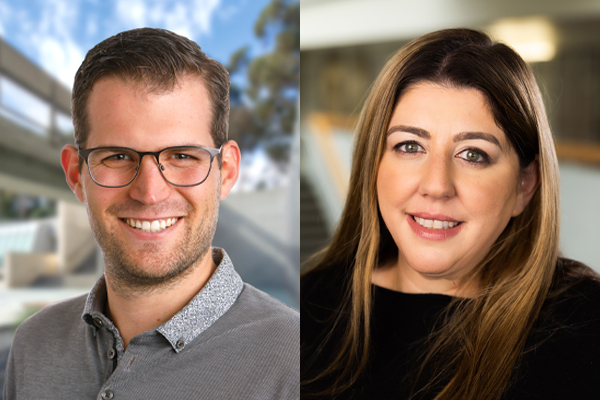Michael Erb and Keren Lasker receive awards from the Donald E. and Delia B. Baxter Foundation to advance technologies that could lead to medicines for severe diseases

Two Scripps Research scientists have been honored with Baxter Young Investigator Awards: Michael Erb, PhD, associate professor in the Department of Chemistry, and Keren Lasker, PhD, assistant professor in the Department of Integrative Structural and Computational Biology. Both Erb and Lasker will receive $125,000 to support their research.
Granted each year by the Donald E. and Delia B. Baxter Foundation, these awards support emerging researchers who are advancing science and technology in a way that can impact patient’s lives. This is the second year in a row two Scripps Research faculty members have received this award, as assistant professors Xin Jin, PhD, and Danielle Grotjahn, PhD, were both named Baxter Young Investigators in 2022.
With the Baxter Foundation’s support, Erb will be advancing new chemistries to drug what was previously considered ‘undruggable.’ Specifically, his lab is interested in uncovering new molecular glues—small molecules that can help attach two proteins together that normally wouldn’t interact. These molecular glues can be used to degrade specific targets of interest, such as proteins that drive diseases like cancer. Because molecular glues do not necessarily require well-defined binding pockets like traditional drugs, they can be used to degrade proteins that were previously considered undruggable. He and his colleagues will pursue a proof-of-concept study to establish high-throughput chemistry methods for turning small molecules into molecular glue degraders.
“Molecular glues hold enormous promise for the future of drug discovery,” says Erb. “Whereas previous discoveries of molecular glues have relied on serendipity or target-agnostic phenotypic screens, we are developing prospective approaches to transform existing ligands into novel molecular glues.”
Lasker is pioneering innovative strategies to address neurodegenerative diseases such as Alzheimer’s. Having made significant contributions to the study of membraneless organelles (MLOs)—droplets inside our cells influencing both health and diseases—Lasker is proposing a novel method. Her approach involves engineering a bacterial MLO to create a synthetic organelle in human cells. This synthetic organelle has the potential to trigger cellular degradation machinery against toxic protein aggregates and ultimately clear them out of the cell. In this case, she will use her award to target toxic protein aggregates that drive the progression of Alzheimer’s and other related neurodegenerative diseases.
“In lay terms, we will design a garbage bag to collect disease-causing accumulations of aberrant tau proteins, which will then be disposed of by the cell’s native garbage disposal system,” Lasker says.